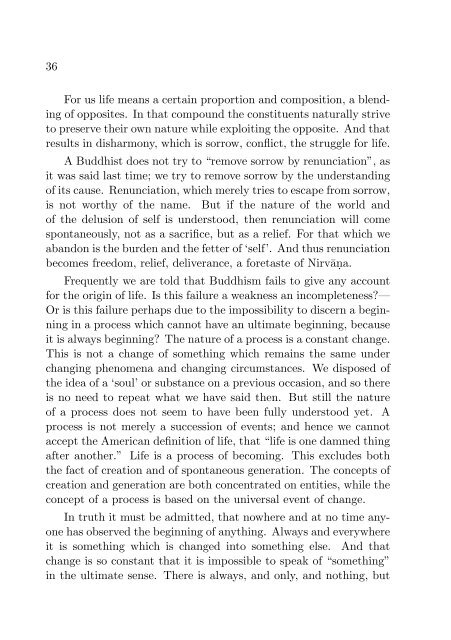Towards the Truth
Notes from a three-day debate in the 1940’s about Buddhism and Christianity.
Notes from a three-day debate in the 1940’s about Buddhism and Christianity.
Create successful ePaper yourself
Turn your PDF publications into a flip-book with our unique Google optimized e-Paper software.
36<br />
For us life means a certain proportion and composition, a blending<br />
of opposites. In that compound <strong>the</strong> constituents naturally strive<br />
to preserve <strong>the</strong>ir own nature while exploiting <strong>the</strong> opposite. And that<br />
results in disharmony, which is sorrow, conflict, <strong>the</strong> struggle for life.<br />
A Buddhist does not try to “remove sorrow by renunciation”, as<br />
it was said last time; we try to remove sorrow by <strong>the</strong> understanding<br />
of its cause. Renunciation, which merely tries to escape from sorrow,<br />
is not worthy of <strong>the</strong> name. But if <strong>the</strong> nature of <strong>the</strong> world and<br />
of <strong>the</strong> delusion of self is understood, <strong>the</strong>n renunciation will come<br />
spontaneously, not as a sacrifice, but as a relief. For that which we<br />
abandon is <strong>the</strong> burden and <strong>the</strong> fetter of ‘self’. And thus renunciation<br />
becomes freedom, relief, deliverance, a foretaste of Nirvāṇa.<br />
Frequently we are told that Buddhism fails to give any account<br />
for <strong>the</strong> origin of life. Is this failure a weakness an incompleteness?—<br />
Or is this failure perhaps due to <strong>the</strong> impossibility to discern a beginning<br />
in a process which cannot have an ultimate beginning, because<br />
it is always beginning? The nature of a process is a constant change.<br />
This is not a change of something which remains <strong>the</strong> same under<br />
changing phenomena and changing circumstances. We disposed of<br />
<strong>the</strong> idea of a ‘soul’ or substance on a previous occasion, and so <strong>the</strong>re<br />
is no need to repeat what we have said <strong>the</strong>n. But still <strong>the</strong> nature<br />
of a process does not seem to have been fully understood yet. A<br />
process is not merely a succession of events; and hence we cannot<br />
accept <strong>the</strong> American definition of life, that “life is one damned thing<br />
after ano<strong>the</strong>r.” Life is a process of becoming. This excludes both<br />
<strong>the</strong> fact of creation and of spontaneous generation. The concepts of<br />
creation and generation are both concentrated on entities, while <strong>the</strong><br />
concept of a process is based on <strong>the</strong> universal event of change.<br />
In truth it must be admitted, that nowhere and at no time anyone<br />
has observed <strong>the</strong> beginning of anything. Always and everywhere<br />
it is something which is changed into something else. And that<br />
change is so constant that it is impossible to speak of “something”<br />
in <strong>the</strong> ultimate sense. There is always, and only, and nothing, but
















